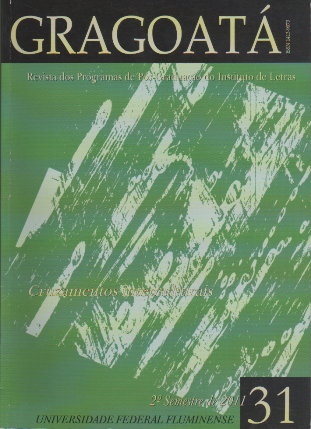The ethical’s construction of literary texts translations from experience: the interaction between academy and society
DOI:
https://doi.org/10.22409/gragoata.2011n31a33051Keywords:
translation, ethics, experience, academy, societyAbstract
This work deals with the necessary interaction among the academy and the media, the editorial market in general, translators with no specific education in the area and non-professional readers. Its aim is to contribute to the enhancement of the awareness not only of the existence of two ethical stands as far as the translation of literary text is concerned – that of the difference and that of the equality, in the terms of Antoine Berman and Lawrence Venuti – but also of the consequences of the privilege of any of them over the other. It will establish a dialogue with the paper presented by Christina Schäffner at the 6th European Society for Translation Studies Congress, which took place in September, 2010, in Leuven, Belgium, in which the perception of translation from the part of the Anglo-Saxon media was discussed, and with texts written by intellectuals for whom, as defended by Aristotle, the construction of ethical stands is based on experience. In order to corroborate and illustrate the points of views herein advocated, it will present teaching strategies put into practice by the author of this work in the disciplines she teaches at the Bachelor’s Degree Course in Translation from English to Portuguese of the University of Juiz de Fora and the conclusions of monographs produced by its students.
Downloads
Downloads
Published
How to Cite
Issue
Section
License
Authors who publish in Gragoatá agree to the following terms:
The authors retain the rights and give the journal the right to the first publication, simultaneously subject to a Creative Commons license CC-BY-NC 4.0, which allows sharing by third parties with due mention to the author and the first publication by Gragoatá.
Authors may enter into additional and separate contractual arrangements for the non-exclusive distribution of the published version of the work (for example, posting it in an institutional repository or publishing it in a book), with recognition of its initial publication in Gragoatá.

Gragoatá is licensed under a Creative Commons - Attribution-NonCommercial 4.0 International.











